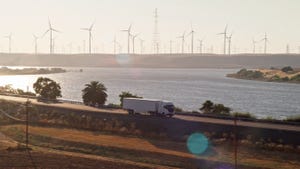Industry Sues State Over Canada Cargo
October 1, 2003
Rebekah Hall
THE NATIONAL SOLID WASTES Management Association (NSWMA), Washington, D.C., and the Michigan network of Republic Services, Ft. Lauderdale, Fla., have put up their dukes in another interstate fight in Michigan. NSWMA and Republic filed a lawsuit on Sept. 5 in the U.S. District Court against Wayne County, Mich., and its executive, Robert Ficano, for passing a law attempting to restrict trash flow from Canada to Michigan.
The lawsuit is the latest development in what is proving to be a controversial subject in waste management. Toronto's Keele Valley Landfill closed in December 2002, and haulers found refuge with Michigan's landfills that had low tipping fees and no state surcharge. Today, Toronto's trash from approximately 2.4 million residents is going to the Great Lakes State.
Renaming Michigan the ‘Great Trash State,’ environmentalists have launched a retaliatory campaign. In addition to environmental groups, including the Ann Arbor-based Don't Trash Michigan, some senate leaders are rounding up public support to keep Canadian trash out of the state. Democratic Sen. Debbie Stabenow collected 92,000 signatures from Michigan citizens in late August to urge the U.S. Environmental Protection Agency (EPA) to help the state block incoming waste from Ontario.
On Aug. 7, Wayne County turned a statewide spurn into a law, proclaiming no local landfills will be permitted to accept waste from an area that does not impose a beverage container deposit law similar to Michigan's, which requires a 10 cent deposit on bottles and cans.
At press time, a motion for a preliminary injunction had been filed and a hearing was scheduled to take place Oct. 6. Until then, the county has agreed not to enforce its law pending the motion's resolution. However, if Wayne County is successful, and a landfill is found in violation of the law, landfill operators could be fined up to $10,000 per day and could possibly face imprisonment.
“[This] measure appears to be motivated by frustration,” says Barry Shanoff, general counsel for the Solid Waste Association of North America (SWANA), Silver Springs, Md. “The county will need to muster a whoppingly persuasive defense.”
NSWMA and Republic contend that Wayne County created a law that obstructs “the disposal of out-of-state and Canadian-generated municipal waste,” according to Bruce Parker, NSWMA president, adding the ordinance violates the U.S. Constitution's Commerce Clause.
Republic owns and operates the Carleton Farms Landfill in Wayne County's Sumpter Township, which accepts approximately 23,750 tons per week of Toronto's trash. While Toronto does not have a bottle return system, according to Lawson Oatest, manager of strategic planning for Toronto's Solid Waste Management Services, the city collects copious materials through its curbside recycling program, including beer cans and soft drink bottles. In 2002, Toronto's diversion rate was 28 percent.
Michigan's recycling rate in 1999 was 20 percent, according to the Lansing-based Michigan Recycling Coalition. Wayne County Executive Robert Ficano told news sources that the law is “an attempt to preserve existing landfill space for the future benefit of our residents,” Ficano says.
Michigan also receives trash from New Jersey, New York, Ohio, Pennsylvania, Indiana, Illinois and Connecticut, but Toronto's trash bumped Michigan's ranking to the second-largest refuse importer in the country. “While Michigan complains about receiving municipal solid waste, it exports a significant amount of hazardous waste to Canada,” says David Biderman, general counsel for the NSWMA.
TORONTO RECYCLING FACTS
Toronto has higher diversion rate than Michigan, with its 20 percent recycling rate.
Canada's Diversion Program | Tonnes |
Curbside Recycling | 134,623 |
Brush & Yard Waste Composting | 35,866 |
Grasscycling* | 10,085 |
Stewardship & Deposit - Return** | 6,535 |
Diversion in Tonnes | 247,359 |
Waste | 639,443 |
Diversion & Waste | 886,802 |
Diversion Rate | 28% |
*Assumes grass in the amount of approximately 15% of the leaf and yard waste stream is left on the lawn as a result of the grass ban policy and grasscycling promotion, using the method set down by CAO Benchmarking Group, Thorold, Ontario. |
You May Also Like


